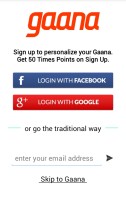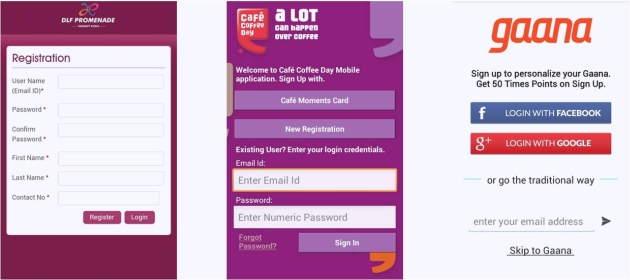Just like some people will never pay for a mobile app – or any digital content for that matter – I’ll never use a mobile app that forces me to register before I’ve had a chance to try it out.
Of course, this rule doesn’t apply to mobile banking, Twitter, HootSuite, and other mobile apps that show my stuff as against generic stuff. (My bank balance is my stuff but USD:INR exchange rate is generic stuff).
My registration phobia is especially targeted towards apps of malls (e.g. DLF Promenade), coffee shops (Café Coffee Day), et al. Since they don’t design their store layout or coffee brew just for me, I see no reason why they should insist on registration as the price of entry. When apps in this category try that, I bail out immediately.
Hi @PromenadeDLF: I won’t register for your app until I’ve tried it. Haven’t I taken enough trouble to scan the QR code & install your app?
— GTM360 (@GTM360) June 22, 2014
Now, these companies can – and do – claim that they’d like to tailor their content to be of greater relevance to me (e.g. “my usual brew” in the case of the coffee shop) and justify their demand for upfront registration on this basis.
I’m not against targeted offers but I’d like to use the app first and figure out if I like it before sharing my profile data and agree to being sold to. So, asking me to register before letting me have a glimpse of the app is a strict no-no.
I use at least three apps that get this: InOrbit (mall), LinkedIn Pulse (newsreader) and RealCalc (calculator). You can use them immediately after installation without completing any form or logging in with your social network credentials. They assume correctly that, if you like them, you’ll open them again, and present their registration screens during your repeat visits. Called “progressive profiling”, this best practice is a fair approach.
Now, that’s me talking from the user’s point of view.
If I think from the perspective of the business, things get tricky.
Brands have invested a lot of time and money in developing their apps. They’re forever under pressure to prove ROI. Progressive profiling may not always work, as in my case: Despite using Pulse and RealCalc regularly for over a year, I’ve not registered on them.
Therefore, app owners are not completely misguided if they believe that the only time to grab the identity of their users is at the very first touchpoint with them.
As we can see, there’s an inherent conflict between the priorities of users and app owners towards registration. This raises the following question:
When Should Mobile Apps Ask Their Users To Register?
Even two decades after the emergence of ecommerce, this debate has not yet been settled in web apps.
 On the face of it, it shouldn’t arise in mobile apps: After all, the first step after unboxing a smartphone is to register it with Apple or Google, who immediately glean the user’s Personally Identifiable Information such as mobile number and email address. Therefore, every smartphone carries a unique ID – unlike a desktop or laptop where there’s no registration step.
On the face of it, it shouldn’t arise in mobile apps: After all, the first step after unboxing a smartphone is to register it with Apple or Google, who immediately glean the user’s Personally Identifiable Information such as mobile number and email address. Therefore, every smartphone carries a unique ID – unlike a desktop or laptop where there’s no registration step.
But the debate still arises since Apple and Google don’t share the PII with app owners.
If this changes, we can expect an end to this debate in the case of mobile apps.
Until then, mobile app owners can get inspired by the “best of both worlds” approach followed by Gaana: The Spotify of India provides a number of ways to register in its splash screen – and incentives for doing so. It also includes a “Skip to Gaana” hyperlink at the bottom in fineprint. Diehard “registrationphobes” like me can take the trouble to spot this link and enter the app without registering. Others can register to proceed.


